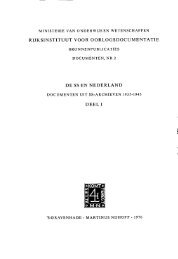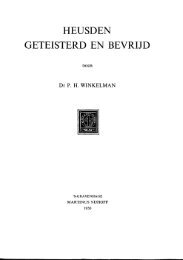De razzia van Rotterdam. 10-11 november 1944 - KNAW
De razzia van Rotterdam. 10-11 november 1944 - KNAW
De razzia van Rotterdam. 10-11 november 1944 - KNAW
Create successful ePaper yourself
Turn your PDF publications into a flip-book with our unique Google optimized e-Paper software.
SUMMARY 2 6 5<br />
Certain aspects of the <strong>razzia</strong> could only be reconstructed by means of a mass of<br />
statistical data. This referred to: the partition of the town in different areas at the<br />
time of the <strong>razzia</strong>; the way in which the transport to the assembly areas was organised;<br />
the routes taken, which was also of importance to determine how long the men stayed<br />
aboard ships or in the trains which carried them to Germany and to find out whether<br />
their mood and their will to escape had been influenced by the situation in which<br />
they found themselves.<br />
The value of the questionnaires largely depended on their number. The quality of<br />
the final result was to be determined by their quantity. However, the author was also<br />
confident that if a large number of questionnaires would be filled in, many striking<br />
details would be communicated. This hope was fulfilled especially as regards the<br />
assistance rendered to the men of <strong>Rotterdam</strong> by the population of the towns and<br />
villages they passed.<br />
Different questionnaires were sent to the men who had been deported, to a large<br />
number of women who had been left behind and to the directors of municipal and<br />
private undertakings. This last questionnaire enabled the author to gain inside<br />
knowledge on the disorganising influence of the <strong>razzia</strong> and to control data supplied by<br />
the Gewestelijk Arbeidsbureau (<strong>Rotterdam</strong> Labour Office), the <strong>Rotterdam</strong>se Bank N.V.<br />
and the banking firm of R. Mees en Zoonen. These two banking firms had given<br />
emergency assistance to the families of men who had been deported.<br />
On other aspects of the <strong>razzia</strong> data were supplied by the municipal police of<br />
<strong>Rotterdam</strong> and Schiedam and by members of the resistance movement. Members of<br />
the police forces who had been on duty during the night of 9 to <strong>10</strong> and <strong>10</strong> to <strong>11</strong> November<br />
<strong>1944</strong> were asked by their superiors to write a report on the movement of<br />
German troops they had witnessed. As there was a curfew in <strong>Rotterdam</strong> at the time,<br />
the police were the only people able to give information on this vital point. Nearly<br />
all of them did so.<br />
The underground press and a few underground pamphlets provided information<br />
on the way in which resistance organisations in <strong>Rotterdam</strong> and elsewhere had reacted<br />
to the success gained by the Germans and on the attitude of the <strong>Rotterdam</strong> population<br />
during and after the <strong>razzia</strong>. The fact that certain members of the resistance movement<br />
had been warned of coming events on the evening before the <strong>razzia</strong>, was established<br />
by means of interviews.<br />
For the introductory chapter on the history of <strong>Rotterdam</strong> during the occupation<br />
and the closing one on developments after the <strong>razzia</strong>, much assistance was received<br />
from many private and municipal institutions; for instance 15.000 files were looked<br />
through by officials of the War Damage Commission <strong>Rotterdam</strong>. These files supplied<br />
data as to the various places in Germany where the men of <strong>Rotterdam</strong> had been sent to.<br />
To sum up, the material finally available to the author when writing the book<br />
was as follows:<br />
1. Personal letters: <strong>10</strong>0 letters, totalling 900 pages.






